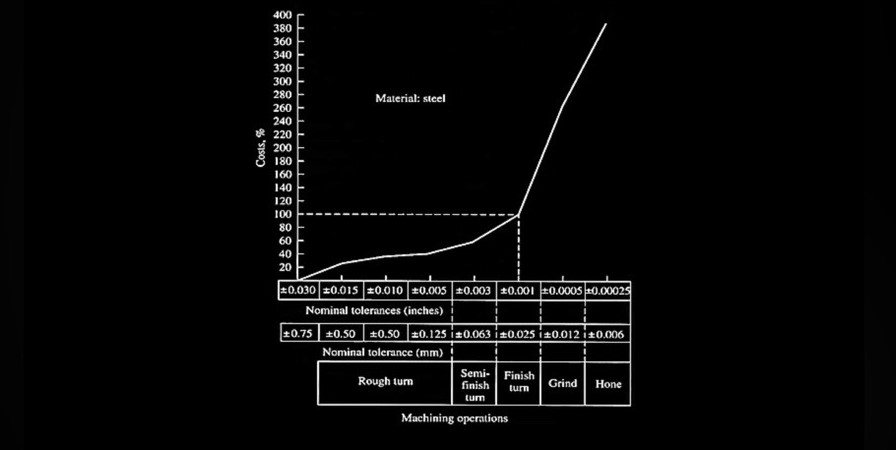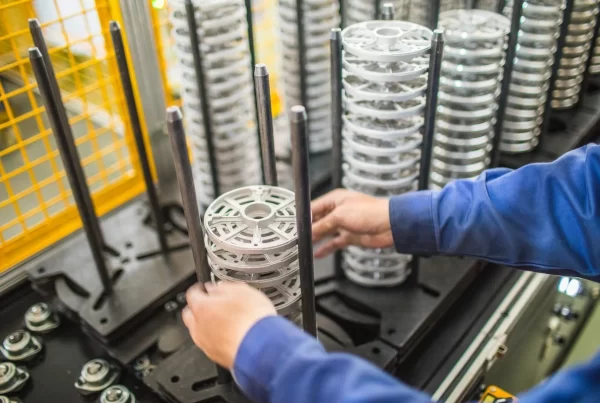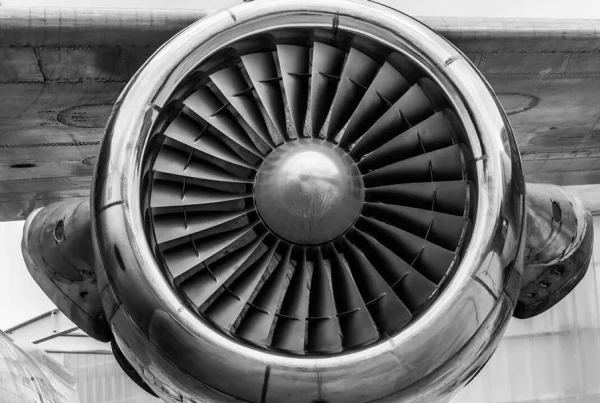In the realm of aerospace and defense manufacturing, precision is paramount. Each component must meet stringent specifications to ensure safety, reliability, and performance. However, achieving high levels of accuracy comes at a price. This article explores how tolerances – the permissible limits of variation in a physical dimension – significantly affect the cost of machining parts.
Understanding Tolerances
Tolerance in machining specifies the allowable deviation from a nominal dimension. For example, if a part is to be manufactured with a dimension of 10 mm ±0.01 mm, the part is acceptable if its dimension is between 9.99 mm and 10.01 mm. Tolerances are critical in ensuring parts fit and function together correctly without causing undue stress or failure.
Tight Tolerances: A Costly Affair
The relationship between tolerances and manufacturing costs is direct and substantial. As tolerances become tighter, the cost to produce parts increases. Check out the image attached. Here’s why tolerances affect cost:
- Increased Material and Tooling Costs: Tighter tolerances often require the use of higher-grade materials that are more consistent and have fewer imperfections. Additionally, specialized tooling is needed to achieve these precise measurements, and such tools wear out faster due to the demands of precision machining.
- Advanced Equipment Requirement: Achieving tighter tolerances necessitates the use of advanced, high-end CNC machining equipment that offer greater control and accuracy. This equipment represents a significant investment in terms of both purchase and maintenance.
- Enhanced Quality Control Procedures: With tighter tolerances, the frequency and complexity of quality inspections increase. Each part must be measured and verified against stricter criteria, which can significantly slow down production and add labor costs.
- Increased Scrap Rates: As the margin for error decreases, the likelihood of producing parts that don’t meet the stringent specifications increases. This results in higher scrap rates, meaning more materials are wasted, and more time is spent producing additional parts to replace those discarded.
- Extended Machining Times: Achieving tighter tolerances usually requires more passes with the cutting tool, slower cutting speeds, and more intricate setups to maintain precision. All these factors contribute to longer production times per part, thereby reducing overall throughput.
Case Studies from the Field
In the aerospace sector, components such as turbine blades are subject to extremely tight tolerances due to the critical nature of their function. The slightest deviation in the shape or size of a turbine blade can alter the airflow and efficiency of an engine, potentially leading to catastrophic failures. Consequently, the cost to manufacture these high-precision components can be many times that of less critical parts.
Similarly, in defense manufacturing, the production of missile components demands exact tolerances. Even minor deviations can impact the trajectory or reliability of a missile, making precision non-negotiable. This precision requires not only advanced machining technologies but also the expertise of highly skilled technicians, further elevating the costs.
Balancing Cost and Precision
Manufacturers must carefully consider the required tolerances during the design phase. By balancing the need for precision with cost constraints, companies can optimize their manufacturing processes. Techniques such as tolerance analysis help in understanding where tight tolerances are crucial and where slightly looser tolerances can be accepted without compromising the performance or safety of the final product.
Tighter tolerances undeniably lead to higher manufacturing costs. In industries like aerospace and defense, where failure is not an option, these costs are justifiable and necessary. For manufacturers, the key to success lies in efficiently managing these costs through smart design and process optimization. Understanding the impact of tolerances on cost is crucial for maintaining competitiveness while ensuring product quality and compliance with industry standards.
While the pursuit of precision is a costly endeavor, it is indispensable in high-stakes industries such as aerospace and defense. By appreciating the intricate relationship between tolerances and machining costs, manufacturers can better navigate the complexities of production to achieve both economic and engineering success.





